How Much Is A Tile Roof In Florida
Are you considering installing a new tile roof? If so, the first question that likely comes to mind is: "How much is a tile roof in Florida?" Installing a new tile roof can be a big investment, and understanding all of your options is essential. But with some knowledge and research, you can make an informed decision about which type of tile roof is right for you. In this article, we'll explore the different types of tile roofs available and what they cost in Florida. Let's dive into the details.
Many factors affect tile roof prices. The cost of installing a new tile roof depends on roof size, materials, labor, and climate. Because Florida has year-round warm weather and access to quality materials from around the world at competitive prices, tile roofing can be a good value for homeowners.
It's important to consider maintenance and repair costs when installing a new tile roof in Florida. Due to the state's intense heat and frequent storms, some tiles may require special care. Before buying a tile roof, consider these factors to get the best deal.
Overview Of Tile Roofs
Florida homeowners prefer tile roofs due to their durability. They provide excellent weather and fire resistance, making your home safer. They beautify any house. If you're considering a tile roof for your home, it's important to understand its benefits.
Choosing a tile roof for your home involves several factors. Consider your climate and terrain when choosing roof tiles. Make sure your tiles can withstand moisture and extreme temperatures. It's also important to consider how much maintenance each tile type requires.
Tile roofs cost more than asphalt shingles or wood shakes, depending on size and installation complexity. Tile roofs can last up to 50 years with proper care, making them more affordable than solar panels or insulation upgrades. With these factors in mind, let's examine today's tile roofs.
Types Of Tile Roofs
Florida tile roofing has several options. Homeowners favor concrete and clay tiles. Each type has advantages that make it a good choice for a new roof.
Concrete tiles are perfect for hurricane-prone areas due to their durability. They also come in many colors and styles, allowing homeowners to match any style. Due to their density and surface area, concrete tiles insulate better than other materials.
Clay roof tiles are durable and beautiful. Clay is heat-resistant and will reflect sunlight away from your home on hot days. Clay tiles are easy to clean and don't need special treatments over time.
Both concrete and clay roof tiles are long-lasting, durable, efficient, and attractive, but their cost depends on size, installation, and material costs. Today's options can be overwhelming, but installing the right tile roof for your home is rewarding. Looking ahead at popular styles in Florida may help narrow down those choices.
Popular Styles In Florida
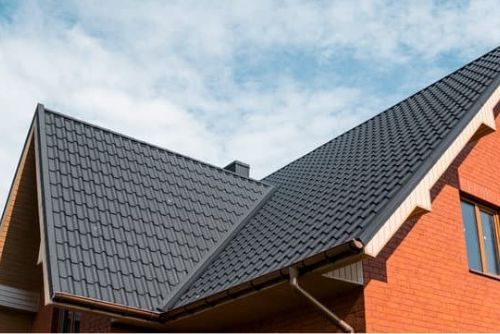
Now that we've discussed the types of tile roofs available, let's explore some popular styles in Florida.
Due to their climate and durability, tile roofs are ideal for Florida homeowners. Clay tiles are popular because they can withstand extreme temperatures, winds, and rain. Clay tiles come in many colors and styles, so you can get the look you want without sacrificing performance.
Here are just a few of the most popular clay tile options:
- Mediterranean Tile Roofs: These traditional tiles have been used throughout Europe for centuries and offer classic beauty with lasting value. They feature low-profile surfaces with curved edges which give them a unique texture while providing superior waterproofing protection.
- Spanish Tile Roofs: This style often features S-shaped curves on each side of the ridge line which gives it distinct character. It also provides excellent rainwater runoff capabilities as well as wind resistance up to 130 mph.
- Barrel Tile Roofs: Also known as semi-cylindrical or Mission tile, this type has rounded edges that provide additional strength against hurricane force winds. Its half cylinder shape makes it ideal for many different home designs plus it offers superior insulation properties too.
Your new roof will last for years, regardless of style. Let's look at these tiles' price ranges so you can choose one that fits your budget.
Price Range For Tiles
Several factors affect Florida tile roof prices. Materials and labor cost $8–$15 per square foot. This range depends on tile type, quality, area covered, and installation complexity.
Tile roofs require more skill to install, so labor costs are higher. Finding a licensed tile roof contractor with experience can save you money. Always get multiple contractor quotes before making a decision.
After discussing tile prices, let's look at some factors that can affect your roof's cost.
Factors Affecting Cost
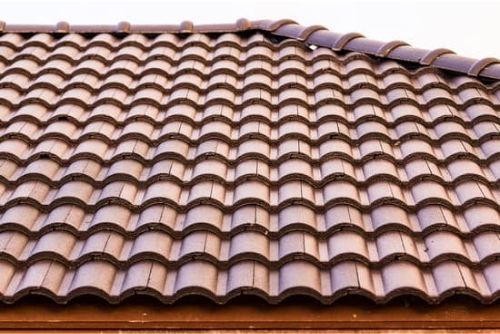
When it comes to finding out how much is a tile roof in Florida will cost, there are several different factors that need to be taken into consideration. These include:
- Roofing Material: The type of material used for the roof plays an important role in determining the overall cost. For example, tiles made from concrete or clay can be more expensive than those made with asphalt shingles. Additionally, some materials may require additional maintenance and repairs over time which could add to the total cost of the project.
- Roof Cost: The size and complexity of the roof also affects its price tag. If you have a larger home with many angles and peaks, then it may take longer to install and thus increase the costs associated with labor and materials. On the other hand, simpler roofs such as flat or gabled ones tend to be less costly due to their easier installation process.
- Tile Cost: Finally, the cost of individual tiles is another factor that must be considered when calculating your total expenses. Different types of tiles come in various sizes and styles which can affect their pricing significantly. It's important to research all available options before making any decisions about what kind of tiles you'd like to use on your roof so that you can make sure they fit within your budget.
Tile roofs in Florida may require more maintenance than other roofing systems. Annual inspections should ensure everything is working and prevent future issues. These steps can extend the life of a tile roof and reduce repair costs.
Maintenance Requirements
After discussing Florida tile roof cost factors, let's talk maintenance. Tiles, like any roofing material, must be cleaned and maintained to protect your home from the elements. Check for loose or broken tiles, which can be replaced. Clean tiles with mild detergents and warm water to avoid discoloration and erosion.
Check your tile roof annually for missing grout lines or cracks that could cause leaks. If you find these issues, a professional must fix them before rainwater gets in, which will cause more damage. If possible, have a professional check everything every few years to make sure there are no hidden issues.
Tile roofs cost more but protect against the weather well when maintained. It's important to consider long-term costs when choosing a roofing material for your home because it needs regular inspections, cleaning, and repairs to perform well.
Benefits Of A Tile Roof
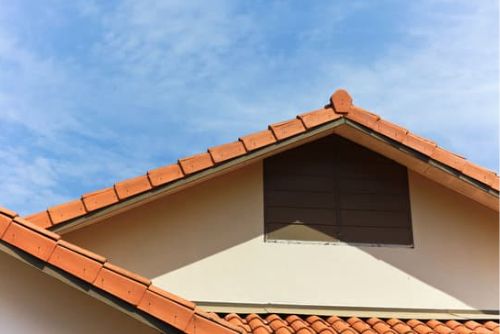
Tile roofs benefit Florida homeowners. Tile roofs are durable. Unlike shingle roofs, they can withstand heavy rain, wind, and hail. Tile is fire-resistant, making it ideal for wildfire-prone homes. Tile roofs are durable and insulated, lowering energy bills year-round.
Tile roofs are attractive. Tiles come in many colors and shapes, making it easy for homeowners to create a beautiful exterior without spending a lot on renovations. Tiles outlast asphalt shingles, so you won't need to replace them soon. Your investment will pay off over time with minimal maintenance.
Finally, tile roofs last longer and cost less to maintain than other roofing materials. A good tile roof could save you thousands in future repairs. These benefits explain why many Florida homeowners choose tile roofs when building or remodeling. Let's examine tile roof lifespan and its factors.
Life Expectancy Of A Tile Roof
Due to their durability and beauty, Florida tile roofs are popular. Tile roofs are expensive, but they last longer and resist fire. Tile roofs last for how long? Let's examine how tile roofs age:
- Tile Type: Different types of tiles have different lifespans. Clay tiles typically last up to 60 years while concrete tiles may last up to 50 years or longer.
- Roof Replacement: Regular maintenance such as resealing joints, replacing broken tiles, and cleaning gutters can help extend the lifespan of your tile roof.
- Life Span Roof System: A life span roof system is designed with built-in redundancy that allows it to be repaired rather than replaced when damaged by severe weather or age. This greatly improves its overall lifetime performance compared to traditional systems without any redundancy features.
- Climate Conditions: The climate also plays an important role in determining how long your tile roof will last; extreme temperatures, high winds, heavy rainfalls, hail storms, and snowfall can all wear down the material over time causing it to need more frequent repairs and replacements.
A well-maintained tile roof can protect your home for decades, but knowing its lifespan will help you maximize your investment. These factors will help you decide if tile roofs are right for you before installing them.
Installation Process
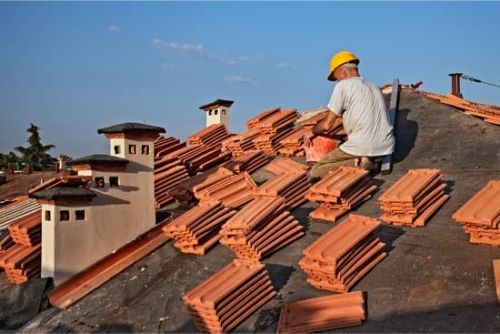
After discussing tile roof lifespan, let's discuss installation. A variety of tools and materials are needed to install roofing tiles. Laying tiles over felt paper or underlayment is a popular method. This prevents water from seeping under tiles and causing damage. After laying this layer, attach metal clips to each tile before nailing or screwing it down. Air pressure differences cause leaks around vents and chimneys, so they must be tiled carefully.
Florida tile roof installation costs depend on size, tile type, and whether professional help is needed. Labour, materials, and taxes average $14–$16 per square foot. Remember that local laws may require additional permits, so check first. However, a good tile roof protects against wind and hail and looks good. In Florida's tropical climate, your new tile roof should last decades with proper care. Let's examine Florida tiled roof permits and regulations.
Permits And Regulations
Florida tile roof installation requires permits and regulations. First, the roof must meet local building codes, usually with concrete or clay tile. Second, your city or county may require additional paperwork for any changes. Finally, use professional installation services because they know these laws and can ensure everything goes smoothly.
To help paint a picture for our audience, here are three key points about permits and regulations:
- A concrete or clay tile roof typically meets state requirements
- Depending on where you live, extra paperwork may need to be obtained
- Professional installers understand all the necessary rules and regulations
Consider whether hiring a professional installer is worth the cost compared to DIY. Professionals know how to complete each step safely and are familiar with permits and regulations, saving you time and trouble. DIY projects often lack ventilation, which can lead to costly repairs. Moving on to professional installers versus DIY projects, tile roofs in Florida require an experienced service provider.
Professional Installers Vs DIY Projects
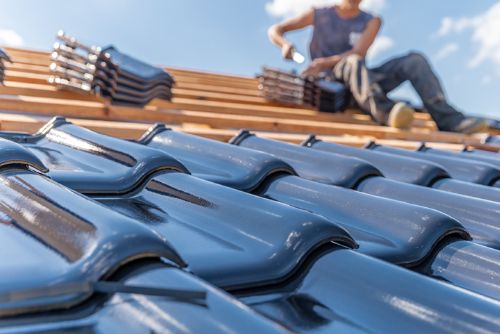
You must decide whether to DIY or hire professionals to install a tile roof on your Florida home. Professionals cost more than DIYers, but their work and materials are usually better. Professional installers use metal tiles instead of ceramic tiles because they can withstand hurricane-force winds. They may offer roofing material installation warranties.
DIY projects may still require knowledge of building codes, local standards, and height safety. Before starting any such project, research what permits are needed. If something goes wrong during construction or afterwards, it could cost you more money.
Cost, convenience, and quality control determine whether to install yourself or hire professionals. This decision should be based on local building codes and standards, which specify how roofs should be installed to protect against Florida's severe weather.
Local Building Codes And Standards
Florida roofing projects must follow local building codes. Tile roofs are beautiful, but many factors must be considered before choosing one. Understand local building codes when calculating tile roof costs.
These regulations will ensure your new roof meets state or county safety and performance standards. Tiles may need underlayment or waterproof grout sealant, depending on where you live. This should be factored into tile roof installation costs. Local building codes require certain tile fire ratings.
Installing it properly maximizes your investment. Poor installation can cause premature damage and costly repairs to a tile roof, which can last 50 years. Before starting, make sure your contractor knows how to lay tile roofs and follows local laws.
Before choosing a new roof, research building codes and hire a qualified professional. Thus, you can maximize your investment and avoid future liabilities. Don't cut corners—insurance and code compliance are equally important.
Insurance Considerations
From local building codes to insurance, it's important to consider Florida's roof types and how they'll affect your wallet. Tile roofs are costly to replace or repair. Tile roofs cost $10–20 per square foot installed. Design elements can increase this price. Tile roofs can last 50 years or more if properly planned and maintained, making them worth the investment.
Before hiring a Florida roofing contractor, do your research. Check online reviews and contractor references for multiple bids. Look at each company's warranties to protect you financially if the installation crew's repair tile job goes wrong.
When choosing a Florida roofing material, consider sustainability and environmental impact. Cool roofs, with reflective coatings applied directly to the tiles, reduce cooling costs in warm climates like Florida. Early research can save money and protect the environment.
Sustainability And Environmental Impact

Many factors affect Florida tile roof sustainability. First, consider the roof's lifetime energy needs. This depends on your roof style and material. Any roof requires regular maintenance and repair, which adds up. If you choose solar shingles or recycled tiles, you're investing in long-term environmental savings.
A well-installed tile roof can last decades with little maintenance. With proper installation and professional inspections, you can enjoy the benefits of a durable tile roof while reducing your carbon footprint.
Financing Options And Payment Plans
After discussing the sustainability and environmental benefits of a tile roof in Florida, let's discuss financing. Concrete, clay, and other roofing materials are available for your home or business. One option may suit your budget and location better.
Florida tile roof financing depends on the installation cost and material. Banks and lenders may offer lower interest rates if you have good credit and are buying new construction or replacing old roofs. Florida tile roof installation costs can be offset by tax credits in many states.
Home Depot and Lowe's offer payment plans without extra fees for customers who don't have access to traditional financing or need more flexibility when making payments. These payment plans require initial deposits, which vary based on installation and material costs but could save thousands of dollars if managed properly. Understanding all financing options before choosing a roofing material is essential to meeting your needs and budget.
Final Thoughts
Finally, Florida homeowners should consider a tile roof due to its durability and longevity. With proper maintenance, Florida tiles last 50 years, so your roof should last decades. Tile roofs are durable and low-maintenance, making them worth the cost of permits and climate considerations. Tiles can be replaced individually without tearing off the roof, making them even more appealing. Tile roofs are ideal for many Florida homeowners because they are durable and affordable. Know how much is a tile roof in Florida before considering to get the job done.
Frequently Asked Questions
What Is The Average Lifespan Of Tiles In Florida?
How long do Florida tiles last? If so, read this article. We'll examine these roofing materials' durability and why Florida homeowners like them.
Tiled roofs can use clay, ceramic, or synthetic tiles. Clay and ceramic are known for their durability and beauty, but they need maintenance. Synthetic tile roofs last 50 years longer than clay or ceramic. They're ideal for homeowners who want a low-maintenance, long-lasting home improvement.
Tiled roofs can withstand Florida's harsh weather if maintained. They also insulate well, keeping your home cool in summer and warm in winter. Tiled roofs also boost resale value.
Overall, a tiled roof is worth considering for your Florida home. With its impressive longevity and cost efficiency, it may be the perfect solution for protecting your home and saving money.
Are There Any Special Permits Required For Installing A Tile Roof In Florida?
Florida tile roofing requires more than materials, supplies, and labor. Installing a new roof legally requires local permits. Understanding what you need to get these permits will help your project run smoothly and legally.
Here are five things to consider when applying for a permit for a tile roof installation in Florida:
- Understand Building Codes: Make sure you have an understanding of any building codes associated with installing a tile roof in your specific location or neighborhood before starting the application process.
- Research County Regulations: Knowing how your county handles tile roofs can help make the process easier. Learning about the rules related to obtaining a permit may save time down the road if there are delays or extra steps involved.
- Check Current Zoning Laws: Zoning laws vary by city and state, so be sure to research them beforehand to determine whether or not they apply to your proposed project. This includes checking on deed restrictions as well as other potential issues such as noise ordinances or height limits.
- Gather Necessary Paperwork: Different counties require different documents when applying for a permit, so make sure you have everything ready before submitting your request. You’ll need information like square footage of the area being covered, drawings of the layout, proof of financial responsibility (such as insurance), and details about who will be doing the work (if hiring contractors).
- Contact Local Permitting Offices: Once you’ve done your research and gathered all relevant documentation, contact local permitting agencies to discuss filing procedures and fees associated with getting approval for installing a tile roof in Florida.
Getting local authorities' permission can take time and money, but knowing this should help you avoid installation issues. Going through these steps ahead of time will ensure that everything goes smoothly, so you can start enjoying the look and protection of your new tile roof right away.
Are There Any Additional Costs Associated With Installing A Tile Roof?
Florida tile roof installation has some hidden costs. If you're DIY-ing, this is crucial. Before starting a home improvement project, know the costs.
Tiles and other roofing system components cost money. Specialized ladders and safety gear should also be considered. Depending on your roof material, these costs can add up quickly.
Purchase extra tiles in case any break during installation or over time. Also, local building permits. Before starting a DIY project, check with your county government to see if permits are required.
Understanding all the costs upfront can help you stay on budget and on schedule, regardless of the roofing material you choose. Preparation saves time and increases success.
Are There Any Special Considerations To Take Into Account When Selecting A Tile Roof For A Particular Climate?
Certain climates require specific tile roofs. To choose the right tile roof for your climate, you must understand temperature and weather changes. Extreme temperatures, wind speeds, and moisture exposure vary by region and tile type. Consider whether your local building codes restrict roof materials.
Consider how much maintenance your tile roof will need in addition to choosing a material for your climate. Depending on their use, some materials require more frequent cleaning or replacement. Local experts who know your climate can help you choose a tile roof that will last and be low-maintenance.
Finally, tile roofs are cheaper than local materials. While price should never be the only factor in this decision, researching potential costs beforehand can help determine which options make financial sense in the short and long term. Understanding these factors before buying a tile roof gives you peace of mind that your investment was wise and sustainable.
How Easy Is It To Replace Individual Tiles In A Tile Roof?
Depending on the material and age of your roof, replacing individual tiles can be difficult. Before replacing or installing a tile roof, know which materials work best in each climate. Clay tiles are better for dry climates and concrete for wetter ones.
Changing the tiles requires several considerations. First, access: replacing a single tile in a hard-to-reach area can be difficult. If parts of the existing tile have crumbled due to wear and tear, that can complicate safe removal and replacement.
Larger tiles require special tools and skills that may not always be available. Finally, knowing how many replacement tiles you need before starting repairs can save time, money, and waste from incorrect measurements during installation.
Overall, replacing tiles on a tile roof isn't easy, but with proper planning and preparation, it doesn't have to be.